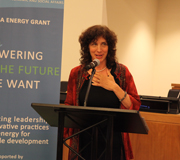
Solar provides power to save lives
This week, non-profit organization We Care Solar became the winner of the first ever US$1 million UN-DESA Energy Grant, to enhance and expand the use of its ‘Solar Suitcase’. The device provides medical professionals in many developing countries with a source of electricity during childbirth. We connected with Dr. Laura Stachel, co-founder of We Care Solar, after receiving the award, and asked her about the award-winning initiative.
DESA: Tell us about the Solar Suitcase. What does this initiative provide for healthcare facilities in developing countries?
Stachel: The lack of reliable electricity in more than 300,000 health centers around the world is a major factor in the continued high rates of maternal mortality, claiming 287,000 lives annually, primarily in Africa and South Asia.
We Care Solar provides the power to save lives. The We Care Solar Suitcase is a compact complete solar electric system, designed to include medical lighting, phone charging, and a fetal monitor. They are prewired systems designed to be robust, simple to use, easy to install, and appropriate for the harsh environments in which they are placed. Solar Suitcases save lives in childbirth by making solar power simple, accessible and affordable.?
The system includes waterproof, break-resistant medical lights, LED headlamps, mobile phone charging equipment, rechargeable batteries, a fetal monitor, and the hardware required for installation in any remote location. The modular system can be adapted to energize a suite of highly efficient medical devices.
 DESA: How big of a role does electricity play maternal health and in maternal survival?
DESA: How big of a role does electricity play maternal health and in maternal survival?
Stachel: When health facilities are without reliable electricity, midwives and doctors struggle to provide life-saving care at night. C/sections are cancelled, procedures are postponed until morning, and in some cases, women are turned away from hospitals when the power is down. Patients have died unnecessarily when they can*t get emergency obstetric care, or when they receive suboptimal care by health providers attempting to conduct life-saving care in near-darkness.
Compact, efficient Solar Suitcases, used by more than 1300 clinics, provide medical lighting and charge cell phones, computers and medical devices, enabling clinicians to treat childbirth complications and avoid needless deaths. We have enabled midwives and doctors to provide lifesaving care, such as conducting deliveries, detecting fetal distress, arranging timely referrals, suturing lacerations, resuscitating babies, and conducting c/sections. By strengthening health service delivery and improving access to maternal health care, this project reduces maternal and newborn mortality, preserves families, promotes economic prosperity and empowers women.
DESA: What kind of support can We Care Solar provide with the help of the grant received from UN DESA?
Stachel: We Care Solar has delivered solar power to first-mile health centers in more than 20 countries, including Sierra Leone, Ethiopia, Uganda, Tanzania, Malawi, Nepal and the Philippines. This project will allow us to penetrate some of these countries more deeply and continue to train health workers in skills allowing them to install and maintain Solar Suitcases.
This 2-year project responds to growing demand for our portable and immediately operational solar devices. It scales up our impact by (1) uplifting hundreds of health facilities with basic electricity in partnership with international agencies, (2) fostering local capacity in training, installation and maintenance with our effective train-the-trainer programs, and (3) enhancing our technology.?
DESA: What is the importance of partnerships between international NGO*s?
Stachel: International cooperation is the key to We Care Solar*s program effectiveness and sustainability.
We work with partners in many countries to build capacity in solar energy utilization, installation and servicing. We work closely with implementation partners in Ethiopia, Sierra Leone, Liberia, Nigeria, Uganda, Malawi, Tanzania, and the Philippines to disseminate our technology, collaborating with international NGOs, UN agencies, and Ministries of Health.
Our train-the-trainer programs build regional capacity in solar energy installation, maintenance and servicing. Classroom trainings include hands-on exercises in solar electricity, use of power tools, safety skills, and trouble-shooting. Our solar mentorship program enables health technicians to gain skills in conducting solar installations at local health centers. Our health facility trainings ensure midwives and doctors learn to use solar technology effectively.
DESA NEWS: What is next on the horizon for We Care Solar, working towards sustainable development?
Stachel: Our efforts to work toward sustainable development include both technological and system-level approaches. In terms of technology, we are developing a new version of the Solar Suitcase 每 one with a new, longer lasting battery technology, more robust lights, and a new user interface that informs health workers if problems arise. That version will be tested in one or two countries in 2016. ?
We are also developing a remote monitor that will allow us to know when Solar Suitcases are in need of repair or servicing.? In terms of ways to address sustainability at the system level 每 we are including troubleshooting and servicing in our capacity building workshop. We are exploring several ways we could develop service response networks in the countries we serve, and the grant will allow us to do this thoughtfully and pro-actively.

Follow Us